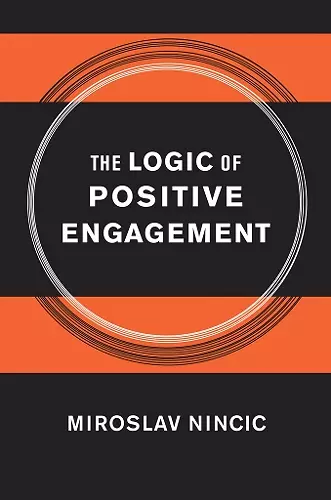The Logic of Positive Engagement
Format:Hardback
Publisher:Cornell University Press
Published:15th Aug '11
Currently unavailable, and unfortunately no date known when it will be back

Recent American foreign policy has depended heavily on the use of negative inducements to alter the behavior of other states. From public browbeating through economic sanctions to military invasion, the last several presidents have chosen to use coercion to advance U.S. interests when dealing with adversaries. In this respect, as Miroslav Nincic notes, the United States differs from many of its closest allies: Canada has long maintained diplomatic relations with Cuba, and several of the European democracies have continued diplomatic engagement with governments that the United States considers pariah regimes. In The Logic of Positive Engagement, Nincic outlines the efficacy of and the benefits that can flow from positive rather than negative engagement.
Nincic observes that threats and punishments may be gratifying in a symbolic sense, but that they haven't affected the longevity or the most objectionable policies of the regimes against which they are directed. Might positive inducements produce better results? Nincic examines two major models of positive inducements: the exchange model, in which incentives are offered in trade for altered behavior, and the catalytic model, in which incentives accumulate to provoke a thorough revision of the target's policies and priorities. He examines the record with regard to long-term U.S. relations with Cuba, Libya, and Syria, and then discusses the possibility that positive inducements might bring policy success to current relations with Iran and North Korea.
"The Logic of Positive Engagement is a welcome corrective to a sanctions literature that for too long has focused its energies on the coercive use of sticks rather than the creative use of carrots. Miroslav Nincic's book provides both the conceptual tools and the careful empirical work to show the way forward." -- Michael Mastanduno, Nelson A. Rockefeller Professor of Government, Dartmouth College
"Miroslav Nincic integrates his previous work on sanctions, renegade regimes, and policy analysis to produce a powerful case for positive inducements, and a devastating critique of the academic and policy mind-sets that neglect them. This wise book brings political philosophy, social psychology, game theory, and a wide knowledge of contemporary history to move away from punishments to an agency-based focus on altering an adversary's motivations." -- Bruce Russett, Dean Acheson Professor of International Politics, Yale University
"Miroslav Nincic's analysis of positive engagement is timely and important: President Obama's decision to diplomatically engage Iran, North Korea, Burma, and other states that defy international norms is a central policy concern. Nincic makes a strong clear case for the efficacy of positive engagement in addressing the varied challenges posed by these states. In doing so, he challenges the prevailing emphasis on punitive instruments in both the policy and scholarly communities." -- Robert Litwak, Woodrow Wilson International Center for Scholars
- Winner of A 2012 Choice Magazine "Outstanding Academic Title.
ISBN: 9780801450068
Dimensions: 235mm x 155mm x 21mm
Weight: 454g
224 pages